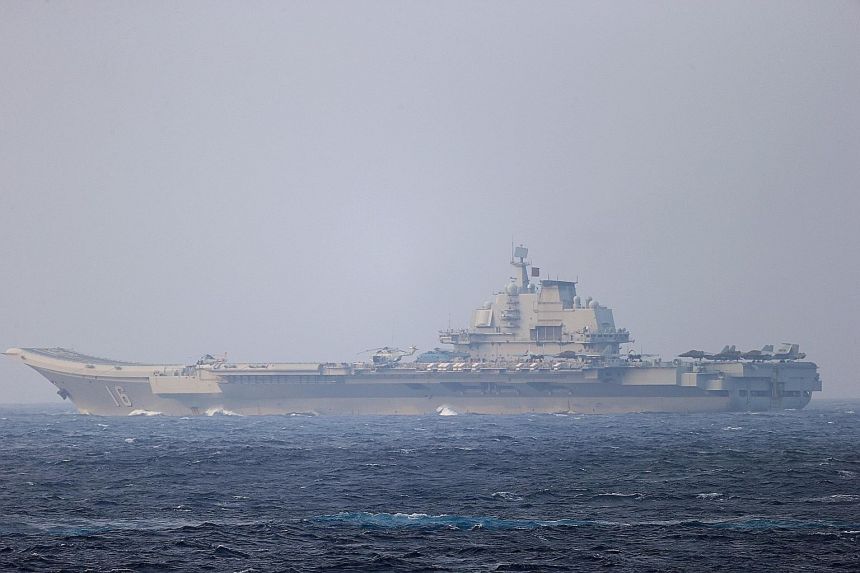Japan raises alarm over Taiwan security for the first time in annual defence review
Sign up now: Get insights on Asia's fast-moving developments

Chinese aircraft carrier Liaoning sailing through the Miyako Strait near Okinawa on its way to the Pacific on April 4.
PHOTO: REUTERS
Follow topic:
TOKYO - Japan directly broached the subject of Taiwan security for the first time in its annual defence review released on Tuesday (July 13), as it raised the alarm over the growing brinkmanship and arms race in the region.
"Stabilising the situation surrounding Taiwan is important for Japan's security and the stability of the international community," Japan's Defence Ministry said in its annual white paper for the first time.
"Therefore, it is necessary that we pay close attention to the situation with a sense of crisis more than ever before."
Taiwan's Foreign Ministry thanked Japan for attaching importance to security in the Taiwan Strait.
But the document provoked China, where Foreign Ministry spokesman Zhao Lijian lambasted Japan for making baseless accusations about Beijing's "normal" defence build-up and legitimate military actions.
"This is extremely wrong and irresponsible," he said. "China is strongly dissatisfied with and firmly opposes the report".
The language used by Japan's Defence Ministry goes further than last year's report, which had merely noted that the overall military balance between China and Taiwan is tilting in China's favour, with the gap appearing to be growing year by year.
The report on Tuesday said: "Attention should be paid to trends such as the strengthening of Chinese and Taiwanese forces, the sale of weapons to Taiwan by the United States, and Taiwan's own development of its main military equipment."
It further cited how China has been further intensifying military activities around Taiwan, including the entry of Chinese aircraft into Taiwanese airspace.
It noted that the US has "demonstrated a clear stance of supporting Taiwan in military aspects", through weapon sales and the transits by US vessels through the Taiwan Strait.
"While Washington has made clear its stance to support Taiwan militarily, it is unlikely that Beijing will make any compromises on its position given that Taiwan is its core interest," the report said.
"As the conflict between the US and China over Taiwan is becoming ever more apparent, it is necessary for Japan to monitor developments with an acute sense of tension."
China regards Taiwan as a renegade province to be brought back to the fold, by force if necessary.
The white paper further noted the tense security environment surrounding Japan, with the rapid military build-up by "military powers with high quality and quantity".
"Chinese military threats, combined with insufficient transparency about China's defence policies and military affairs, have become a matter of grave concern to the region, including Japan and the international community," it said.
The report further urged China to play a more cooperative role with the region and the international community to allay tensions.
China's defence budget of 1.36 trillion yuan (S$283.9 billion) this year, or a 6.8 per cent increase from last year, eclipses Japan's budgeted 5.34 trillion yen (S$65.4 billion), itself a rise of 0.5 per cent, the white paper said.
Comparing their defence armada, China owns 52 modern submarines to Japan's 21 and 71 modern destroyers and frigates to Japan's 47. China also has a whopping 1,146 fourth- and fifth-generation fighter jets to Japan's 313.
"China has sustained high-level growth of its defence budget without transparency, engaging in broad, rapid improvement of its military power in qualitative and quantitative terms with focus on nuclear, missile, naval and air forces," the white paper said.
The document cited China's superiority in new domains such as space, cyber and the electromagnetic spectrum, as it warned of the growing threat of "hybrid warfare".
The white paper also noted that longstanding issues of territorial rights continue to be unresolved, reiterating Japan's claim to islands over which it is embroiled in territorial disputes with its neighbours.
Japan administers the East China Sea islets it calls Senkaku, a claim that is disputed by China, which calls them Diaoyu.
Japan lays claim to the South Korea-administered Dokdo, which it calls Takeshima, in the Sea of Japan, which is referred to as the East Sea on the Korean Peninsula.
It also claims the Russia-administered Southern Kuril islands, which Japan calls the Northern Territories. These islands lie off the northeast coast of Hokkaido.
Japan's defence review suggested that one means to overcome regional security challenges was through the creation of a "regional cooperation framework in the security realm" that covers the Indo-Pacific region.
Japan seeks to do this through the "strategic promotion of multifaceted and multi-layered defence cooperation" under its Free and Open Indo-Pacific vision.
While Japan formally has only one security ally, the US, Tokyo is promoting closer defence partnerships with regions like South-east Asia, Australia, New Zealand, India, Canada, as well as with European countries like Britain and France.

